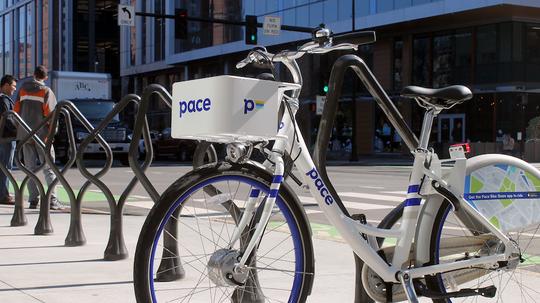
Less than a week after San Mateo-based LimeBike raised a $70 million round —bringing the one-year-old bike-share startup's total funding to $132 million — an 11-year-old competitor in Cambridge is offering a major contrast in approach to fundraising and expansion efforts.
Zagster announced on Wednesday that it has raised a $15 million growth equity round to accelerate the rollout of the new dockless bike-share program the company introduced last fall. The financing, which was led by return investor Edison Capital Partners, brings the company's total funding to $32.2 million.
That figure is a small fraction of the hundreds of millions of dollars raised by LimeBike and other dockless bike-share providers. In China alone, Ofo and Mobike have raised more than $2 billion combined from investors. Among the backers for LimeBike, Ofo and Mobike are big-name firms like Tencent, Sequoia, Alibaba and Andreessen Horowitz.
While Zagster has been relatively modest with its fundraising efforts, founder and CEO Tim Ericson thinks his Cambridge-based company has some big differentiators that will play to its advantage over time. For one, his company has been around longer than most bike-share companies, including Motivate, which runs the Hubway program in Boston.
"We can do a lot more with less money because we’ve been in the game for a lot longer."
This has given the company ample time to build profitable bike-share programs in more than 200 communities across 35 states. It has also allowed the company to develop relationships with bicycle suppliers for more favorable terms.
"We can do a lot more with less money because we’ve been in the game for a lot longer," Ericson told BostInno.
Zagster is also banking on its unique approach to the dockless bike-share trend as a long-term play. Unlike dockless providers like LimeBike, Ofo and Mobike, Zagster's new Pace program requires users to tether their bike to a fixture with a cable that's included before they can finish the trip. Pace also has designated low-cost bike racks that can be found near certain businesses or other destinations that want to attract more pedestrian traffic.
With this approach, Pace has the benefits of dockless (allowing people to take their bikes anywhere there is a fixture, to a certain degree) while avoiding one major disadvantage: the clutter that can happen with other dockless programs since people can technically leave their bikes anywhere, even if companies discourage users from clogging up sidewalks.
Zagster may not be able to control where users tether their bikes — the company encourages tethering to fixtures that are legally permissible — but at least they can't be left in the middle of a walkway. The downside to Pace is that bikes can't be left outside a program's service area (otherwise the company might charge a fee).
Despite this limitation, Zagster's unique approach to dockless bike-share could help the company gain favor with more cities over time. That's because cities like Dallas and states like Florida are now considering regulations to limit where free-standing dockless programs like Ofo can park bikes in reaction to the litter they can create. This puts Zagster in a position to boast its own system, which is designed to reduce clutter.
"We believe that all cities in the next five years that are moving toward a dockless bike-share will enact regulations that bikes lock to things," Ericson said.
Paul DeMaio, a principal at bike-share consultancy MetroBike, told BostInno that the winning dockless systems will be those with better bike management practices.
"Jurisdictions want safe conditions for their residents and visitors," he said. "I regularly read about the public's discontent with finding some dockless bikes as tripping hazards on sidewalks or in places they shouldn't be, such as on private property or in ponds."
While most of Zagster's more than 200 locations are docked programs right now, the company is making a big push for its Pace dockless system with this new funding round. Pace is currently live in Tallahassee, Fla., and Knoxville, Tenn., with plans to open in dozens of other cities this year. The company is also planning to transition existing docked customers to Pace over time.
Fontinalis Partners, a Detroit-based venture capital firm that has invested in Zagster, said while the company isn't the only one in the bike-share space to offer programs to cities and universities at no extra cost, its novel take on dockless and its reputation will help it win.
"The difference with Zagster is that the company has built-in credibility from running hundreds of successful bike sharing programs and its model still uses bike racks (at no cost to the city) as an important mitigant to avoid the 'bike blight' problem many cities that have welcomed dockless bike sharing are now dealing with," Chris Stallman, a partner at Fontinalis, said.








